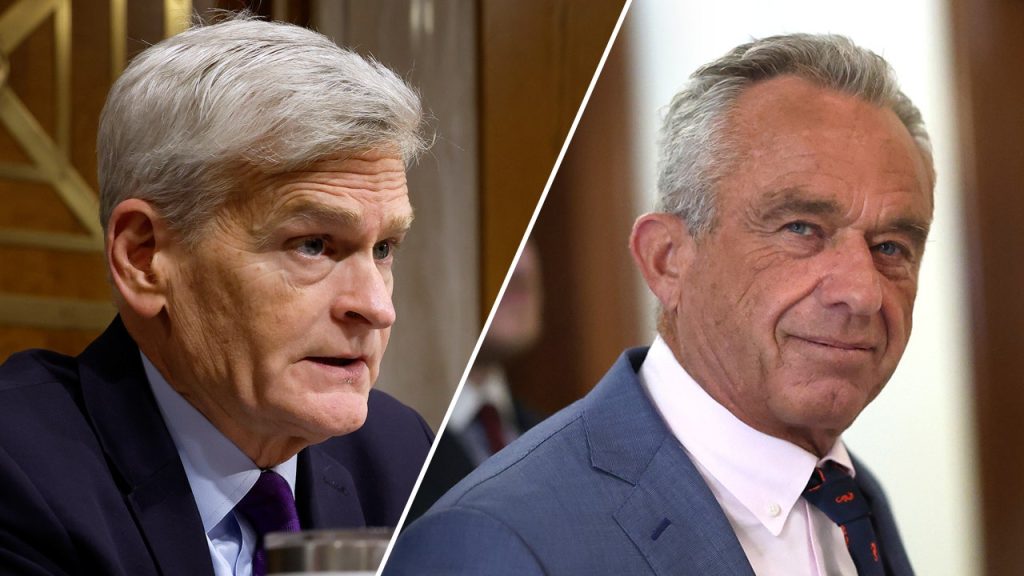Robert F. Kennedy Jr.’s nomination as the head of the Department of Health and Human Services (HHS) has sparked debate, particularly regarding his stance on vaccinations. Senator Bill Cassidy, a Republican from Louisiana and the incoming chair of the Senate Committee on Health, Education, Labor, and Pensions, publicly expressed his disagreement with Kennedy on this crucial issue. While acknowledging shared viewpoints on other health matters, such as the detrimental effects of ultra-processed foods, Cassidy firmly stated that Kennedy’s position on vaccines is “wrong.” This disagreement has raised questions about whether Cassidy will oppose Kennedy’s confirmation, though the senator has declined to comment on his voting intentions before meeting with the nominee and allowing the Senate confirmation process to unfold.
Kennedy’s history of vaccine skepticism has fueled concerns among health experts and lawmakers. He has been a vocal critic of vaccine safety, often raising concerns about potential side effects and advocating for greater transparency regarding vaccine ingredients and testing procedures. While Kennedy has publicly stated that he does not intend to restrict access to vaccines, his persistent questioning of their safety has alarmed many who believe such rhetoric could contribute to vaccine hesitancy and undermine public health efforts. The divergence in opinion between Kennedy and Cassidy highlights the significant challenges Kennedy may face in securing Senate confirmation, as his views on vaccines could alienate key members of the committee responsible for evaluating his nomination.
The controversy surrounding Kennedy’s stance on vaccines underscores the ongoing debate about the balance between individual choice and public health. While proponents of mandatory vaccination emphasize the importance of herd immunity and disease prevention, critics express concerns about potential government overreach and the right of individuals to make informed decisions about their own health. Kennedy’s nomination has brought this debate to the forefront, raising questions about the appropriate role of government in promoting vaccination and the potential consequences of appointing a leader who has expressed skepticism about established public health practices.
The potential impact of Kennedy’s leadership on the HHS is a subject of considerable speculation. The department plays a critical role in overseeing and implementing public health policies, including vaccination programs. If confirmed, Kennedy’s influence on these policies could have significant ramifications for public health, particularly given his previously expressed reservations about vaccine safety. Some fear that his leadership could lead to a weakening of vaccine mandates or a reduction in funding for vaccination programs, potentially jeopardizing efforts to control and eradicate preventable diseases.
Beyond the issue of vaccines, Kennedy’s nomination also raises questions about the future direction of the HHS under his leadership. His emphasis on diet and nutrition, while welcomed by some, has also drawn criticism from those who believe his focus on these issues might distract from other critical public health priorities. The HHS is responsible for a wide range of health-related matters, including disease control, research, and healthcare access. It remains to be seen how Kennedy would prioritize these various responsibilities and whether his leadership would lead to significant changes in the department’s focus and approach to public health.
The Senate confirmation process will play a crucial role in determining Kennedy’s suitability for the role of HHS secretary. The Senate Committee on Health, Education, Labor, and Pensions will carefully scrutinize his qualifications, experience, and policy positions. The committee’s hearings will provide an opportunity for senators to directly question Kennedy about his views on vaccines and other health-related matters. These hearings will likely be highly contentious, given the significant controversy surrounding Kennedy’s nomination. The outcome of the confirmation process will have far-reaching implications for the future of public health policy in the United States.

